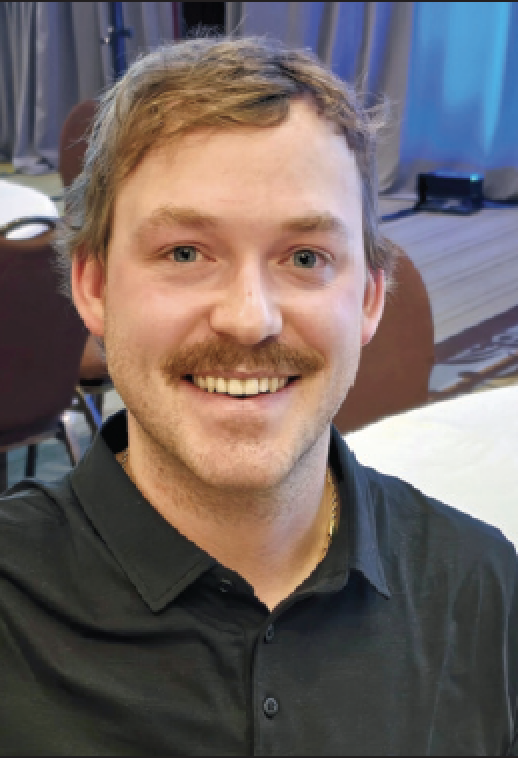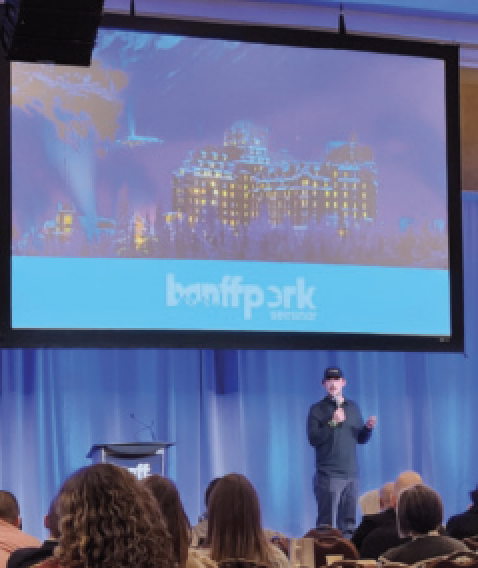
Yesterday’s Change, Tomorrow’s Strength
Only rarely does the final session at Banff Pork Seminar draw as strong of crowd. It’s common for attendees, speakers and sponsors to pack up after lunch on the second day, leaving a fairly sparse audience gathered for the final plenary.
Not this time.
On the afternoon of Thursday, January 9, a strong contingent of attendees filed into the room to hear from a young man whom most had never met, but whose story they all knew.
Hockey player Tyler Smith, 26, raised and schooled in Leduc, took the stage to share his story of mental and emotional recovery after surviving a bus crash that took the lives of 16 people and forever changed the lives of the 13 survivors, their families and a much broader community of people horrified by the tragedy.
“For some reason, that day, as my billet brother and I went to the bus, (my billet mom) looked out the front window and she started to cry. She said she’s never done that.
“There’s a grandmother that suffered a stroke probably a week before the crash; (she) warned the boys in the hospital. She kept repeating: 29 people get on a bus.”
Smith said hearing those stories still gives him goosebumps. But he cannot recall anything that happened that day.
On April 16, 2018, 29 people from the Humboldt Broncos Junior A hockey team did get on a bus after having brunch at Johnny’s Bistro. They headed up the highway, anticipating a game against the Nipawin Hawks.
At Armley Corner near Tisdale – about 90 minutes northeast of Humboldt – the bus collided at highway speed with a semi truck whose driver had missed a stop sign. Fourteen of the hockey players and support staff were killed. Two more died later of their injuries. The casualties included 18-year-old goalie Parker Tobin – Smith’s billet brother – and their coach, Darcy Haugan.
Smith’s right wrist bears a collection of memory bracelets dedicated to the Humboldt crash. His right forearm bears a tattoo of Haugan’s favourite saying: “It’s a great day to be a Bronco, gentlemen.”
In Banff, with no prepared notes or formal presentation, Smith spellbound and sometimes joked with an enraptured crowd about his mine-strewn road to mental and emotional recovery.


He had suffered multiple injuries, including a stroke, and remained in a coma for the first four days after being airlifted to Calgary. He awoke to a lineup of visitors: Oilers star Connor McDavid, broadcaster Ron McLean, country music artist Paul Brandt, broadcaster and former Boston Bruins coach Don Cherry, Prime Minister Justin Trudeau and dozens of friends and family.
His response in those days, as his physical injuries healed, was to tell everyone he was fine and to get back in the saddle as a forward with the Humboldt Broncos. After about 10 games, he knew that wasn’t working and he continued to deny the affects the crash had left on his mind and spirit. He learned to self-medicate with alcohol, because it kept him distracted.
“I did the first game. I did the first bus ride, and I did the first dinner-table conversation like I said, without Parker Tobin across from me, and after 10 games, I couldn’t do it anymore. I texted my parents and said I’m not having fun anymore. Now, I’m not a parent, but I know there’s a lot of parents in this room and I can imagine it’s a pretty excruciating thing, when your child has announced that the game that has brought him so much joy and so much love for 19 years is stripped, gone.”
He credits three leaders – his billet mom, his mom and his fiancé, Kat Kastner (they won Amazing Race Canada together in 2023) with providing the compassion, courage, caring and strength he needed to find resilience in his battle against his hidden demons.
“I knew I needed to go home, but I couldn’t let anybody down, so I went to my girlfriend’s house and had a conversation that changed my life,” said Smith.
“She shared with me that there’s no right or wrong way to do this, but you’ve got to start somewhere … you need to realize that once you take that first step, there’s so much strength, so much vulnerability and so much courage attached to that, it’s true.”
With support from Kastner and his two moms, Smith began working toward confronting his own emotional wounds and turning his personal trauma into an opportunity to help others. He told the audience in Banff that he has a story, and he has realized over the past seven years that people are very good at diminishing their own stories.
“People are very good at thinking to themselves, ‘I know somebody that’s got it worse and I know somebody that’s got it better, So why would I take care of my own stuff?’
“Now, after today, I want you to try your best that you can to carry your own stuff. I regularly get asked the question of why do you keep doing this? I know that there’s probably a timeline, for me with speaking, I’ve done this over 200 times and believe it or not, I still have an immense amount of imposter syndrome.
“I’m thinking to myself right now like what am I doing up here? I don’t know anything about pigs. I’m going to be honest with you. I love bacon, I love pork, yes. But I truly don’t know the first thing about pork, so what am I doing up here?”
“There’s connections in your life that can lead to meaningful conversations that can help change your perspective and help shift your perspective. Truly, the amount of perspective that I’ve gained from people that I never thought I’d align with or never thought I’d connect with is incredible. I don’t want you to compare your story with mine, I don’t want you to think to yourself, you know, I don’t fully understand what he went through so, like, I don’t think my story kind of connects with that.”
He asked his audience to relate to authenticity as a daily practice of “letting go who we think we’re supposed to be and embracing who we are.”
To choose authenticity means cultivating the courage to be imperfect, to set boundaries and to allow ourselves to be vulnerable, he said. It means exercising the compassion that comes from strength and struggle and nurturing the connections and sense of belonging that happen only when we believe that we are enough.
“Authenticity demands whole-hearted living and loving, even when it’s hard. You do not want to go on when wrestling with the shame and fear of not being good enough, especially when the joy is so intense and we’re afraid to let ourselves feel it
“One of the main things I’ve learned is your story can be the spotlight at the end of other people’s tunnels. Never diminish your story, never think ever to yourself, I know somebody who’s got it worse or who’s got it better. Acknowledge your story. It’s never too late to get involved in your own life.”
Smith closed his talk to a quiet crowd of a seminar that had attracted nearly record numbers, at 798 registrants.

EXAMINING THE CRYSTAL BALL
The 2025 Banff Pork Seminar included a global outlook by Idaho-based analyst Brett Stuart, founder of Global AgriTrends and a repeat visitor to the BPS podium.
Included in his presentation was his view in terms of where Canadian pork exports stand in relation to their counterparts in the United States.
“Some of those things that as producers you don’t love to do, those things have made a big difference in Japan,” said Stuart.
Canada is now the majority supplier of chilled pork in Japan, with Canada and Brazil taking the biggest market share out of Japan last year, he said.
“And so, I’m going to be speaking next week to the (US) National Pork Board, and I’m going to be talking a little bit about that. They’re going to have to eat Humble Pie. They kind of got their butts kicked last year in Japan, and honestly, I’ve dug in and said: ‘What’s caused that?’
“It’s a lot of things that you guys have done. It’s your Verified Canadian Pork. It’s traceability.”
Stuart demonstrated shifts in international markets and inferred improved outcomes for Canadian exports in the coming year, noting that Donald Trump’s return to the Whitehouse after elections in November has created a change in geopolitical dynamics.
“It was a vote saying, ‘Whatever we’re doing, we want to do something different,’ and it was such a strong sentiment that it even actually elected President Trump, so this changes things.”
Stuart suggested that Trump’s ideas, including making Canada a 51st state and imposing a 25-per-cent import tariff, are not real threats so much as a means of driving people to the table to negotiate with him.
“I don’t think he’s bluffing, but I think what he’s doing is opening a negotiation. He’s saying, ‘Let’s talk,’ which Canada did.
“So, in his trade agenda, he said, ‘I want to penalize those trade-deficit nations, those nations that have a trade deficit with the US, we have to find a way to fix this trade deficit,’”
Stuart suggested that the challenge to other countries is that he wants to spur manufacturing in the US. That poses a problem, because a strong or rising US economy means Americans have more money to spend on goods from other countries.
A tariff on Canadian pork could backfire in the US, which imports about 11 per cent of its total supply, largely from Canada. A penalizing tariff would redirect that supply to other countries with price pressure felt in Canada from additional supplies.
“Canada ships five million feeder pigs to the US. That’s a tough one, right? There’s no third option there . . . and there really isn’t the infrastructure (in Canada) to slaughter and feed.”
Stuart drew a scenario in which a 10-per-cent tariff offset against a 70-cent Canadian dollar means sellers would see the same price they were getting before the tariff is imposed.
“I think the most important thing for this industry really to watch is one, the liv pigs from Canada, what happens there; and also Mexico, because the US now ships 40 per cent of our hams to Mexico.”
Outside the session, Canadian Pork Council Executive Director Stephen Heckbert offered his thoughts about how Canada’s pork exports are fairing and what obstacles and opportunities could be coming down the tube.
Heckbert concurred with Stuart’s statement that the 2024 election would bring a great deal of change.
“(Trump) is going to have a tremendous amount of sway over the Canadian-American relationship and the Canadian-American-Mexican relationship. We’ll just have to come to terms with the fact that our reality today is different than we would have necessarily thought it would be six months ago.”
Canada’s pork industry has to deal with what that would mean overall, and especially in terms of conversations with American partners.
“We have to help them understand how it hurts them, not how it hurts us,” said Heckbert.
“But they’re very concerned about how it’s going to hurt them. We’re the Number One trading partner – to the good – for 34 American states. Thirty-four American states have a trading surplus with us.
“Iowa is one of them. Iowa ships us a lot of bacon and a lot of whiskey, so from that perspective, we have to find a way of telling that story.”
Heckbert said Canadian and American industry leaders have been taking their trading relationship for granted, meaning Canadians must now treat American markets the way they treat markets in Japan, reminding them about the quality of Canadian products, why Canada has an important relationship with them and what that relationship means to them.
Expanding on Stuarts comments regarding import tariffs proposed by the new president, Heckbert said they would increase inflation by at least five per cent while Trump doesn’t want inflation and “hates” high interest rates.
“He’ll do both of those things immediately, and then wonder how he got this so wrong. I just think . . . that the Law of Unintended Consequence has never been broken, and I think we’re about to see that will remain true again,” said Heckbert.
“We are in a global commodity market, so we can do one of two things around that. We can sort of continue to play in a global commodity market and be a commodity provider at low cost. Or, we can really build these kinds of longer-term relationships with key trading partners like we’ve done with Japan. So if we build those kinds of long-term relationships that can survive . . . we’re going to be much better off, long term.”

Jorge Correa, vice-president of marketing and technical affairs for the Canadian Meat Council, picked up the discussion in his presentation, giving an overview of his organization’s role as an umbrella representative for red meat producers and processors.
“We are Canada’s oldest national trade association, that represents federal meat processors for over 100 years. In our membership, we have not only pork, but we have other species: cattle, veal, lamb, bison, even horse. We represent processing plants, packing plants and further processing and cold storage where we store our products.”
The CMC’s mission is to advocate competitiveness domestically and globally to enable growth of Canada’s meat sector, said Correa.
“So many of you have heard that the Canadian Meat Council is merging with Canada Pork and yes, it’s true. We are now one association, and we are looking for more efficiencies. We want to look for better service for our members and our industry.”
Correa said the association is looking for bigger and more unified goals for the pork sector in 2025 to present a more unified voice to trade partners, government and media.
Anticipating political changes from the US election and from the recent resignation of Prime Minister Justin Trudeau, along with a change in ambassadors to seven key countries, CMC now has people positioned in Washington, DC and Des Moines, Iowa to watch political developments at federal and state levels.
“We want to see just what politicians are saying in the United States and our counterparts. We are doing our homework.”
Overseas manoeuvres include opening an office this year in China, said Correa. While the CMC does not have contact with the Chinese government, it does have a good relationship with the Chinese ambassador to Canada, he said.
“It is very difficult for our government because of all the geopolitical situations, but us, as an industry, we’ve been leveraging and influencing a decorum in China, we’ve been visiting them and we’ve been successful.”
Correa also discussed uncertainty relating to port strikes and further losses in the number of workers available as well as the need to stop smuggled meat products from bringing African swine fever into Canada.
CMC is a player in Canada’s ASF working plan, which has been prepared to prevent the disease from entering the country in the first place and also lays out responses to maintain business continuity as much as possible in the event of an outbreak.

Plenary sessions also included educator Kristen Cumming’s description of how different generations view themselves in the workforce and her forecast for a worldwide labour shortage as family size decreases.
Virologist Angela Rasmussen of VIDO, based on campus at the University of Saskatchewan, spoke about the prevalence and impact of misinformation and disinformation on efforts to manage outbreaks.
Misinformation is unintentional, where disinformation is the deliberate communication of fictional information to discredit and confuse, she said.
The Banff Pork Seminar, held in 2025 at the Fairmont Banff Springs, is a joint project of the University of Alberta; Alberta Agriculture and Irrigation, and Alberta Pork. The annual seminar operates under the oversight of an advisory committee, led this year by Steve Davies of Maple-Leaf Agri-Foods. Ongoing direction is provided by University of Alberta Prof. Micheal Dyck and Prairie Swine Centre CEO Murray Pettit. Keeping the seminar’s heart beating is U of A conference coordinator Ashley Steeple. U of A Prof. Ruurd Zijlstra was unable to serve as co-director this year because of classroom obligations. He was in attendance to give a technical presentation on novel proteins in swine diets.
Pettit closed the 2025 seminar with acknowledgement of the staff, volunteers and sponsors who enable its continued success.
This year, 67 sponsors contributed a total of $200,000 in support, an average of $250 per registrant, said Pettit. That $250 represents the additional cost of each individual’s registration fee if the seminar did not have those sponsors, he said.
Pettit encouraged attendees and sponsors to book again for 2026, when the seminar is set to open on January 6.
Please visit banffpork.ca for more information. •
— By Brenda Kossowan





